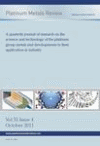Platinum Metals Review - Volume 50, Issue 2, 2006
Volume 50, Issue 2, 2006
-
-
Phosphoramidite-Controlled Asymmetric Hydrogenation with Rhodium Catalysts
More LessAuthors: By David J. Ager, André H. M. de Vries and Johannes G. de VriesPhosphoramidites, and in particular those derived from BINOL, the MonoPhos family of ligands, have proven extremely useful for the asymmetric hydrogenation of carbon–carbon unsaturation using a rhodium catalyst. Many classes of alkenes can be reduced by these catalyst systems. The use of high-throughput experimentation can be applied to the synthesis of MonoPhos ligands and their subsequent screening, in order to find an appropriate candidate for a specific transformation. Suitable mixtures of ligands can also be found by these high-throughput methods.
-
-
-
Thermophysical Properties of Rh3X for Ultra-High Temperature Applications
More LessAuthors: By Yoshihiro Terada, Kenji Ohkubo, Seiji Miura and Mohri TetsuoThermal conductivity and thermal expansion were measured for the L12 intermetallic compounds Rh3 X (X = Ti, Zr, Hf, V, Nb, Ta) in the temperature range 300–1100 K to evaluate the feasibility of applying the compounds as ultra-high temperature structural materials. The thermal conductivities of Rh3X are widely distributed over the range 32–103 W m–1 K –1 at 300 K, but the differences between the thermal conductivities diminish at higher temperatures. A trend is observed in that the thermal conductivity of Rh3 X is greater if the constituent X belongs to Group 5 rather than to Group 4 in the Periodic Table. The coefficient of thermal expansion (CTE) values of Rh3X increase slightly with increasing temperature; values are concentrated around 10 × 10–6 K–1 at 800 K. CTE values of Rh3X decrease as X appears lower in the Periodic Table. It is demonstrated that Rh3Nb and Rh3Ta are suitable for ultra-high temperature structural applications due to their higher thermal conductivities and smaller CTE values.
-
-
-
Ruthenium Allenylidene Complexes
More LessAuthors: Valerian Dragutan and By Ileana DragutanThis paper presents a detailed account of an array of well-defined ruthenium allenylidene complexes as a promising class of metathesis pre-catalysts. This type of ruthenium complex is readily accessible from commercial reagents, induces good to excellent metathesis catalytic activity and selectivity, and shows a great tolerance towards many organic functional groups. By virtue of these beneficial features, ruthenium allenylidene complexes allow synthesis of a wide range of heterocyclic and carbocyclic compounds through ring-closing metathesis (RCM) and enyne metathesis as well as production of specialty polymers by acyclic diene metathesis (ADMET) and ring-opening metathesis polymerisation (ROMP).
-
-
-
The Discoverers of the Palladium Isotopes
More LessBy By J. W. ArblasterThis is the fourth in a series of reviews of circumstances surrounding the discoveries of the isotopes of the six platinum group elements. The first review, on platinum isotopes, was published in this Journal in October 2000, the second, on iridium isotopes, was published here in October 2003 and the third, on osmium isotopes, was published in October 2004 (1). The current review looks at the discovery and the discoverers of the thirty-four isotopes of palladium.
-
Volumes & issues
-
Volume 58 (2014)
-
Volume 57 (2013)
-
Volume 56 (2012)
-
Volume 55 (2011)
-
Volume 54 (2010)
-
Volume 53 (2009)
-
Volume 52 (2008)
-
Volume 51 (2007)
-
Volume 50 (2006)
-
Volume 49 (2005)
-
Volume 48 (2004)
-
Volume 47 (2003)
-
Volume 46 (2002)
-
Volume 45 (2001)
-
Volume 44 (2000)
-
Volume 43 (1999)
-
Volume 42 (1998)
-
Volume 41 (1997)
-
Volume 40 (1996)
-
Volume 39 (1995)
-
Volume 38 (1994)
-
Volume 37 (1993)
-
Volume 36 (1992)
-
Volume 35 (1991)
-
Volume 34 (1990)
-
Volume 33 (1989)
-
Volume 32 (1988)
-
Volume 31 (1987)
-
Volume 30 (1986)
-
Volume 29 (1985)
-
Volume 28 (1984)
-
Volume 27 (1983)
-
Volume 26 (1982)
-
Volume 25 (1981)
-
Volume 24 (1980)
-
Volume 23 (1979)
-
Volume 22 (1978)
-
Volume 21 (1977)
-
Volume 20 (1976)
-
Volume 19 (1975)
-
Volume 18 (1974)
-
Volume 17 (1973)
-
Volume 16 (1972)
-
Volume 15 (1971)
-
Volume 14 (1970)
-
Volume 13 (1969)
-
Volume 12 (1968)
-
Volume 11 (1967)
-
Volume 10 (1966)
-
Volume 9 (1965)
-
Volume 8 (1964)
-
Volume 7 (1963)
-
Volume 6 (1962)
-
Volume 5 (1961)
-
Volume 4 (1960)
-
Volume 3 (1959)
-
Volume 2 (1958)
-
Volume 1 (1957)
Most Read This Month

Most Cited Most Cited RSS feed
-
-
Metal-Ligand Exchange Kinetics in Platinum and Ruthenium Complexes
By By Jan Reedijk
-
-
-
The Preparation of Palladium Nanoparticles
By By James Cookson
-
-
-
Diesel Engine Emissions and Their Control
By By Tim Johnson
-
-
-
Recycling the Platinum Group Metals: A European Perspective
By By Christian Hagelüken
-
-
-
A Healthy Future: Platinum in Medical Applications
Authors: By Alison Cowley and and Brian Woodward*
-
-
-
Palladium-Based Alloy Membranes for Separation of High Purity Hydrogen from Hydrogen-Containing Gas Mixtures
Authors: By Gennady S. Burkhanov, Nelli B. Gorina, Natalia B. Kolchugina, Nataliya R. Roshan, Dmitry I. Slovetsky and Evgeny M. Chistov
-
-
-
A Review of the Behaviour of Platinum Group Elements within Natural Magmatic Sulfide Ore Systems
Authors: By D. A. Holwell and I. McDonald
-
-
-
Platinum as a Reference Electrode in Electrochemical Measurements
Authors: By Kasem K. Kasem and Stephanie Jones
-
-
-
Carbon Nanotubes as Supports for Palladium and Bimetallic Catalysts for Use in Hydrogenation Reactions
Authors: R. S. Oosthuizen and V. O. Nyamori
-
- More Less

